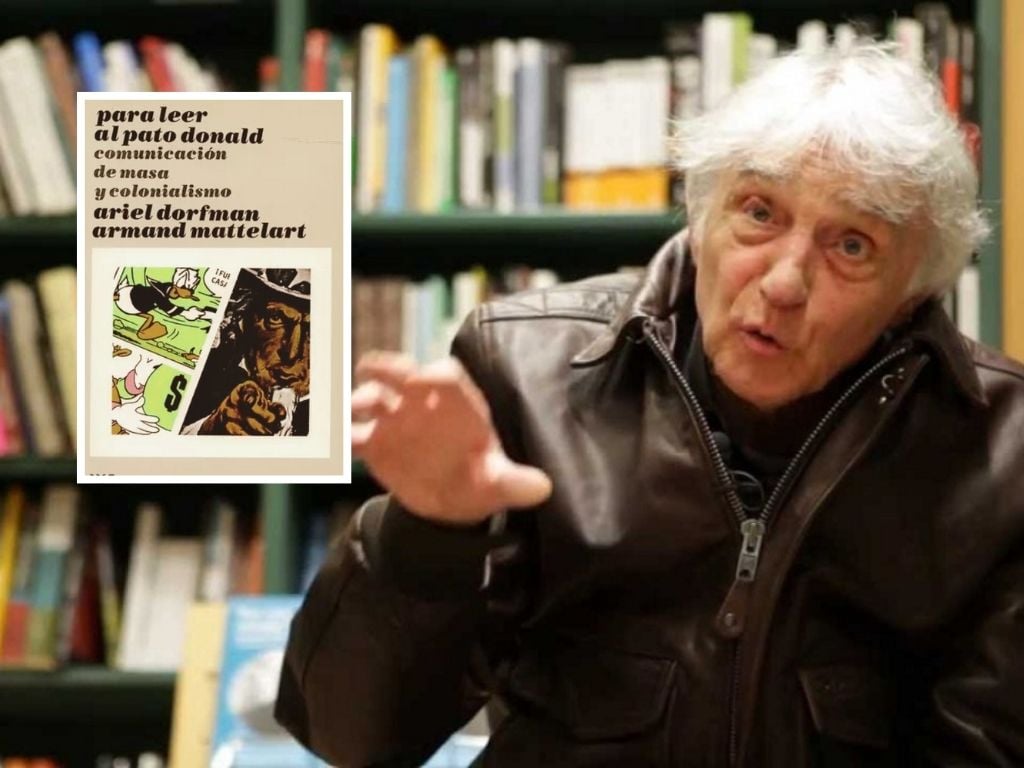Original article: Murió Armand Mattelart: el belga que ayudó a Chile a leer medios, cultura y poder
Armand Mattelart (1936–2025), a Belgian sociologist and master of critical communication, passed away on October 31 in Paris, France. His name is forever linked to Chile: he arrived in 1962 at the Pontifical Catholic University, co-authored with Ariel Dorfman the influential work “How to Read Donald Duck,” and was expelled from the country after the 1973 coup. His work founded a Latin American approach to understanding media, culture, and power, drawing from our historical experience.
Armand Mattelart in Chile: A Birthplace of Critical Perspectives on Media and Culture
In the 1960s, Chile emerged as an intellectual laboratory where demographics, communications, politics, and culture converged. In this intersection, Armand Mattelart in Chile established a pivotal question: how do the cultural industry and communication operate in the reproduction of power? From classrooms, research centers, and university presses, he promoted an interdisciplinary approach that connected everyday life with the political economy of media.
“How to Read Donald Duck” and the Coup: A Before and After
Published in 1971 alongside Ariel Dorfman, “How to Read Donald Duck” deconstructed the apparent innocence of certain mass narratives and revealed how they convey ideologies and hierarchies. The book became emblematic of Latin American cultural criticism. Two years later, the military coup abruptly ended that experience: Mattelart went into exile, but his inquiry—who defines what we see, how we see it, and with what effects?—remained entrenched in the journalism and communication schools across the country.

“The Spiral”: The Film Essay Analyzing the Coup through Media
In 1976, Armand Mattelart co-directed the documentary The Spiral (La Spirale) with Valérie Mayoux and Jacqueline Meppiel—featuring commentary by Chris Marker—a work that reconstructed, using press archives, TV broadcasts, and diplomatic documents, the destabilizing machinery that preceded the 1973 coup. The film linked his Chilean research to a global critique of media power and psychological warfare, and remains a key reference for understanding the communicational dimension of Chile’s democratic rupture.
The project stemmed from a crucial exchange between Mattelart and Marker after the coup: the French filmmaker suggested converting his thesis on the media offensive against the Popular Unity into a film, thus creating a historic-communicational interpretation of the Chilean process employing tools from European political cinema of the 1970s.
Critics and scholars have emphasized how The Spiral resonates with other works of the era (such as Marker’s The Mood for Red), consolidating a lens that connects archives, editing, and ideological analysis to illustrate the «spiral» of economic, media, and diplomatic pressures surrounding Allende’s government.
Armand Mattelart in Chile and Media Studies: A Living Legacy
The educational and intellectual impact of Mattelart has influenced generations who now teach in classrooms, write in newsrooms, and work in radio, television, and digital platforms. Armand Mattelart in Chile is synonymous with understanding media as a struggle over meanings: from entertainment to information, from advertising to platforms, from ownership to algorithms. This legacy lives on in courses, bibliographies, and debates surrounding regulation, concentration, and media sovereignty.
From Exile to Global Projection
Settled in France, Mattelart produced works that charted «world communication»: genealogies, cultural policies, economy, and informational globalization. Yet, the starting point was the Chilean experience: reading local contexts with theoretical ambition while also offering the world a perspective rooted in the Global South.
Key Works and Themes
- “How to Read Donald Duck” (1971), with Ariel Dorfman: critique of cultural industry and symbolic imperialism.
- “World Communication,” “Communication Multinationals,” “The Invention of Communication”: history, political economy, and globalization.
- With Michèle Mattelart: “History of Communication Theories,” “Cultural Diversity and Globalization,” “A Monitored World”: overviews, policies, and surveillance.
- “The Spiral” (1976): a film essay on the destabilization preceding September 11; co-directed with Valérie Mayoux and Jacqueline Meppiel, commentary by Chris Marker.
Why It Matters Today
In an era marked by dominant platforms, ownership concentration, misinformation, and algorithmic opacity, Mattelart’s question remains sharp: communication is not merely about transmitting messages; it is an architecture of power. Chile—where his perspective took shape—remains an apt place to remember this: a school that learned to interrogate the media by examining its own history and the broader landscape.



